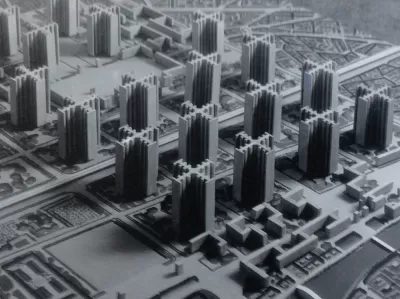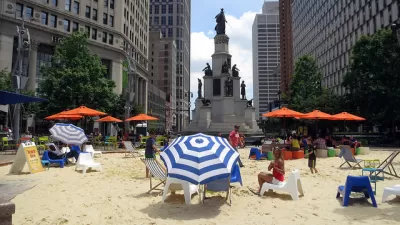Charles Wolfe calls attention to similarities between contemporary urbanism and yesterday's debunked utopias. The two may differ in substance, but both tend toward a certain level of dogma that isn't necessarily helpful on the ground.

"Like today," Charles Wolfe writes, "planning activities of a century ago sought improved residential quality, including a scheme which correlated scaled streets according to use, local stores, the community school, parks, playgrounds, open space, and social interaction among neighbors." These days, he goes on, we often criticize those principles of yesteryear for oversimplification, architectural determinism, and their lack of provisions for environmental sustainability and social equity.
But is it possible that planners of the future will see many of today's urbanist concepts in a similar light? Wolfe writes, "Absent large swaths of single-entity ownership, redevelopment of our current urban landscape is not easy — with limited raw land available for straightforward public or private sector-led development without sophisticated mitigation solutions."
In that context, "prescriptive" goals involving smart growth, placemaking, sustainability, and the like may fail to achieve their visionaries' wider aims without "reality checks against the challenges of design, equity, regulation and financing, and [the need to] be addressed at an integrated and practical level worldwide." We shouldn't be so certain, in other words, that our own utopias aren't as flawed as those of our predecessors.
FULL STORY: Overselling utopia? The urbanist’s dilemma

Planetizen Federal Action Tracker
A weekly monitor of how Trump’s orders and actions are impacting planners and planning in America.

Congressman Proposes Bill to Rename DC Metro “Trump Train”
The Make Autorail Great Again Act would withhold federal funding to the system until the Washington Metropolitan Area Transit Authority (WMATA), rebrands as the Washington Metropolitan Authority for Greater Access (WMAGA).

The Simple Legislative Tool Transforming Vacant Downtowns
In California, Michigan and Georgia, an easy win is bringing dollars — and delight — back to city centers.

The Small South Asian Republic Going all in on EVs
Thanks to one simple policy change less than five years ago, 65% of new cars in this Himalayan country are now electric.

DC Backpedals on Bike Lane Protection, Swaps Barriers for Paint
Citing aesthetic concerns, the city is removing the concrete barriers and flexposts that once separated Arizona Avenue cyclists from motor vehicles.

In These Cities, Most New Housing is Under 441 Square Feet
With loosened restrictions on “micro-housing,” tiny units now make up as much as 66% of newly constructed housing.
Urban Design for Planners 1: Software Tools
This six-course series explores essential urban design concepts using open source software and equips planners with the tools they need to participate fully in the urban design process.
Planning for Universal Design
Learn the tools for implementing Universal Design in planning regulations.
Smith Gee Studio
City of Charlotte
City of Camden Redevelopment Agency
City of Astoria
Transportation Research & Education Center (TREC) at Portland State University
US High Speed Rail Association
City of Camden Redevelopment Agency
Municipality of Princeton (NJ)




























